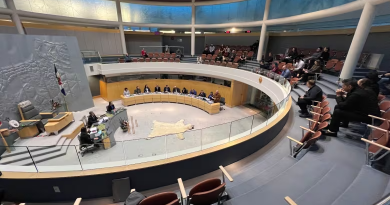Trudeau says Trump’s ‘dumb’ trade war is designed to collapse the Canadian economy

An unbowed Prime Minister Justin Trudeau said Tuesday that Canada will hit back hard at the U.S. after President Donald Trump launched a North American trade war by slapping devastating 25 per cent tariffs on virtually all Canadian goods.
Speaking to reporters at a news conference on Parliament Hill, Trudeau said Trump is trying to prompt “a total collapse of the Canadian economy” because he thinks that will “make it easier to annex us.”
But Trudeau said that will never happen because “when it comes to defending our great nation, there is no price we all aren’t willing to pay.”
Trudeau said Canada will not back down from a fight in the face of “completely bogus and completely unjustified” trade action that has the potential to ruin bilateral relations and prompt job losses, economic devastation and higher inflation on both sides of the border.
Trudeau has already slapped tariffs on an initial tranche of $30 billion worth of American goods and promised $125 billion more will face levies in three weeks’ time. He said more, non-tariff measures are coming if Trump doesn’t immediately back down.
Trudeau said Trump is doing something “very dumb” by attacking Canada like this, given there will be serious ramifications for American workers and consumers with higher prices on everything from food, car parts and fertilizers to pharmaceuticals and paper products.
“Your government has chosen to do this to you,” Trudeau said in remarks directed at the American people. “A fight with Canada will have no winners.”
Trudeau said Trump’s claims that these tariffs are all about the flow of fentanyl is nonsense and it’s now clear there was never a possibility of avoiding these tariffs by cracking down on the border as Canada did in the last few months.
Trudeau said Trump’s actions could destroy one of the most successful relationships the world has ever known while also drawing closer to a “lying, murderous dictator” like Russian President Vladimir Putin.
“The United States launched a trade war against Canada, their closest ally, their closest friend, at the same time they are talking about working positively with Russia,” Trudeau said. “Make that make sense.”
The premiers are already promising countermeasures of their own, including pulling American liquor off store shelves, hiking road tolls for American commercial drivers and blocking U.S. firms from bidding for government procurement contracts to try and force Trump to reverse course.
Ontario Premier Doug Ford said he agrees with Trudeau’s contention that Trump is trying to prompt an economic collapse in Canada.
Like Trudeau, Ford said he’s prepared to “fight like we’ve never fought before.”
Ford said he is prepared to go through with some more draconian measures, including possibly levying an export charge on every megawatt of power Ontario sells to the U.S. in the coming days. He also said he’s open to cutting off energy supplies entirely to plunge some 1.5 million customers in the U.S. into darkness, if necessary
In an interview with CNN, Ford said Canadians are “absolutely livid,” there’s a swell of Canadian patriotism as shoppers boycott American products and his government will use every tool in the toolbox to hit back against “the one man” who has ruined what was once the best bilateral relationship in the world.
Pointing to the plunging U.S. stock indexes, Ford said he hopes Trump pulls back now that the “market is going to go downhill faster than the American bobsled team.”
Vance says Canada hasn’t been ‘serious’ at the border
Vice-President JD Vance told reporters on Capitol Hill Tuesday that the president is “going to have conversations with the Canadians.”
“We need to see real engagement on the fentanyl issue. That is fundamentally the underlying element for tariffs. The Canadians have not been serious about stopping the drug trade,” Vance claimed.

Vice-President JD Vance argued fentanyl is the reason for the tariffs. (Manuel Balce Ceneta/AP Photo)
Despite Vance’s assertions, the Canadian government has been busy rolling out a $1.3 billion border security package designed to curb the illegal drug trade and the flow of migrants — and that’s already producing results.
Data from the U.S. Customs and Border Protection (CBP) released earlier this month shows there has been a significant decrease in seizures of fentanyl coming from Canada.
The CBP’s own data registered a 97 per cent drop in January compared to December 2024 at the northern border — evidence, the Canadian government says, that its new border security measures are bearing fruit and the Americans are being unreasonable.
In addition to appointing a fentanyl czar whose only job is to lead a nationwide crackdown on the deadly drug, the federal government has also deployed some 10,000 border and law enforcement personnel along the Canada-U.S. boundary and sent new helicopters and drones into the skies to keep a closer eye on the 49th parallel.
Even before these new efforts, Canada represented less than one per cent of all seized fentanyl imports into the U.S., according to federal data. About 19.5 kilograms was seized at the northern border last year compared to 9,570 kilograms at the southwestern border, according to the U.S. government data.
Lana Payne, the president of Unifor, Canada’s largest private-sector union, issued an “economic call-to-arms” in what she’s calling “a full-on trade war.”
“Every Canadian politician, business leader, worker and resident must fight back. Trump has seriously misjudged the resolve and unity of Canadians, and he has misjudged how damaging this trade war will be for American workers,” she said.
Trump’s tariff will make most Canadian goods less competitive because American importers will now have to pay the U.S. government a 25 per cent levy to bring them into the country.
Those added costs could then be passed on to American consumers, pushing up the price of everything from car parts and fertilizer to pharmaceuticals and paper products.
Some importers may decide to drop certain Canadian products altogether, putting pressure on Canadian businesses and the people they employ.
Industry groups are already warning of dire consequences. Canadian Manufacturers and Exporters said Trump’s tariffs “threaten the future of the most successful economic relationship in the world.” The Canadian Federation of Independent Business called the brewing trade war “a massive economic threat.” The Grain Growers of Canada said the trade war “could push many family farms to the brink.”
Global Automakers of Canada, the industry group that represents 25 carmarkers like BMW and Honda, said Trump has to quickly lift his tariffs “to avoid permanent and significant damage to the North American automotive sector.”
The Business Council of Canada said Trump’s actions have left the trilateral trade deal that he himself negotiated in his first term, the Canada-U.S.-Mexico Agreement (CUSMA), in tatters. “No one wins in a trade war and the tariffs imposed today by the Trump administration will hurt workers, farmers and families,” the council said.
Related stories from around the North:
Canada: Arctic ice shift: Melting multiyear floes trigger decline in vital pressure ridges, CBC News
Finland: US, Norwegian forces in Lapland for rapid reinforcement exercise, The Independent Barents Observer
Norway: Thawing permafrost melts ground under homes and around Global Seed Vault in Svalbard, The Independent Barents Observer
Russia: Atlantification ushering in new era of sea ice loss in the Siberian Arctic, Eye on the Arctic
Sweden: Updated version of Sweden’s preparedness guide sent out to households, Radio Sweden
United States: Blog: Trump’s cuts and US Arctic research, are the risks only just beginning?



